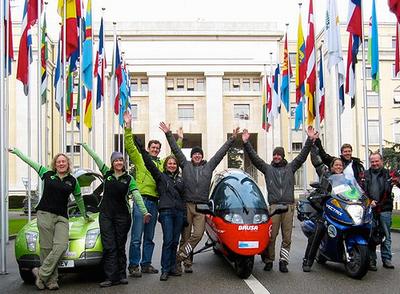World’s First Zero Emissions Race Crosses the Finish Line
GENEVA, Switzerland, February 24, 2011 (ENS) – Electric vehicle race teams competing in the world’s first Zero Emissions Race crossed the finish line in Geneva today after circumnavigating the globe.
Environmentally friendly and virtually silent, it took the three teams 80 running days to drive their solar powered electric vehicles some 28,000 kilometers around the world, crossing 16 countries. The race was patterned after the idea behind author Jules Verne’s novel “Around the World in 80 Days.”
Often encountering adverse road and weather conditions, the entire race event took 188 days in total, with stopovers in more than 150 cities, including a celebrated pit stop in December 2010 at the UN Conference on Climate Change in Cancun, Mexico.
“This morning, all the three teams set out with a lot of excitement from Le Bourget du Lac, and as they crossed the border of Switzerland, the feeling turned a little nervous as it started to snow! So, on the last day of the Zero Race, the teams drove to Geneva in real winter conditions! But they did well, as they arrived punctually,” wrote Dr. Julianna Priskin, official blogger for the race.
Exactly at 11 am, in honor of completing the Zero Emissions Race, the gates of the UN Palace of Nations opened again to let the race vehicles enter as they had opened to start the race on August 16, 2010.
 |
Zero Emissions Race teams at the finish line, the UN Palace of Nations in Geneva – the Australian vehicle, left, the Swiss vehicle, center, and the German motorbike, right. (Photo courtesy Zero Emissions Race) |
Present to welcome the teams from Switzerland, Australia, and Germany were Sergei Ordzhonikidze, director-general of the UN Office in Geneva; Andrey Vasilyev deputy executive secretary of the UN Economic Commission for Europe; and Sylvie Motard of the UN Environment Programme.
“The aim was to raise awareness across the world of the alternative low-carbon economy and to foster the use of zero-emission vehicles for people’s mobility,” said Vasilyev.
“I really believe that the Zero-Race has educated, has raised public awareness, has inspired and has helped governments and people to take action towards a sustainable future,” Vasilyev said. “My congratulations to you for this very successful initiative, for your courage and determination to sensitize the world on the climate change challenge.”
“Today, the entire international community shares the same concern of climate change,” said Vasilyev. “The risks of climate change cause global problems, therefore requiring a global solution. There is a clear consensus amongst scientists, policy-makers, experts and business leaders that concerted action is needed to address climate change through the reduction of greenhouse gas emissions, especially those of CO2.”
This was not a race of different teams against each other, explained co-ordinator Louis Palmer, the first person to circumnavigate the world in a solar-powered vehicle, the Solartaxi.
Instead, the teams were evaluated by a point system on tasks they had to solve with their exhaust-free vehicles. The Oerlikon team from Switzerland finished in first place.
“It is great that our team could win this very fastidious race,” Helmut Frankenberger, CEO of the sponsoring company Oerlikon Solar, said today. “This shows that emission-free mobility solutions can be suited to everyday life, even under difficult conditions. The Zero-Race is a milestone on the way to make solar power economically usable in the form of fuel and thus a genuine alternative.”
“There is only one team, and that’s the Zero Race team. We help each other and do the race together, in sportsmanlike atmosphere, for a greener future,” the Zero Race website states.
The Swiss team of Tobias Wulser and Frank Loaker told the “Gibralter Chronicle” newspaper that the race experience is like “flying half a meter above the ground in comfort.”
The Australian Team Trev is Cheristine Haydon and Alexandra Jones, who said, “We want to show the world that we can drive 30,000 kilometers around the world in an electric vehicle. We should all be driving them to and from the shops, and embracing a new opportunity to respect our planet.”
Copyright Environment News Service (ENS) 2011. All rights reserved.
